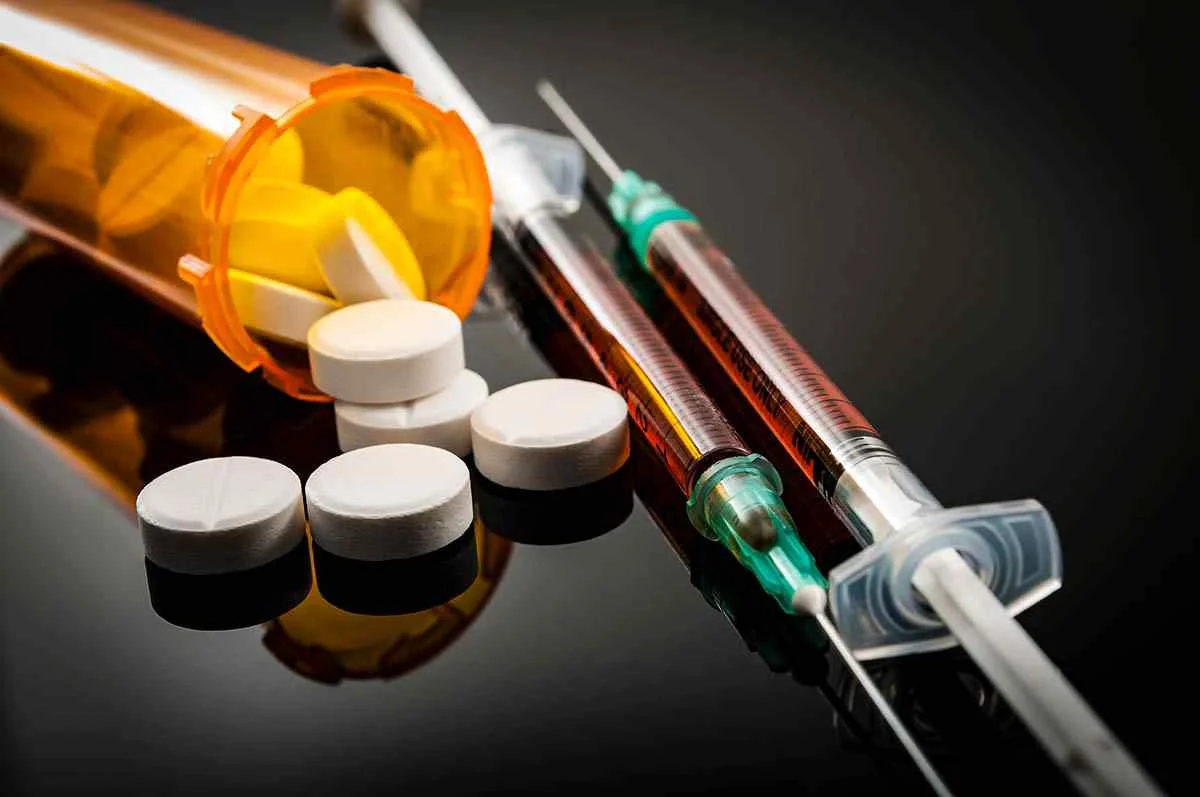Heroin

Heroin is a highly addictive and rapidly acting opioid drug that is derived from morphine.
Other Names: Diacetylmorphine, Morphine Diacetate, Poppy, Smack, Skunk, Thunder, White Horse, Black Tar, Big H, Chiva, Hell Dust
Heroin enters the brain very quickly, binding to and activating its mu-opioid receptors (MORs). This opioid substance can slow down a person’s breathing, enhance their sensations of pleasure and relaxation, and reduce their feelings of pain even if they have suffered a serious injury.Its ability to induce euphoria and relaxation is why heroin remains as one of the most popular illegal drugs in the United States today.
Heroin is classified as a Schedule I substance under the U.S. Controlled Substances Act.This means that it has a high potential for abuse and dependence, and that it currently does not have any accepted medical use in the country.
How is Heroin Abused?
Heroin typically comes in either a white or brownish powder or a sticky black substance, hence its street name of “black tar.” Sometimes when it is sold on the streets, it is adulterated with similar-looking substances like powdered milk, sugar, starch, talc, or quinine powder.
As per the U.S. Drug Enforcement Administration, heroin abuse often occurs through the following means:
- By injection of its liquid form into the bloodstream using syringes
- By wrapping the drug in foil and heating it in order to smoke it
- By inhalation of the drug in its pure powdered form (snorting)
Drugs That Interact with Heroin
Below are some of the drug classes that can have serious interactions with heroin:
- Central nervous system (CNS) depressants: Drugs that produce additional CNS depressant effect like benzodiazepines, non-benzodiazepine sedative hypnotics, barbiturates, alcohol and other opioids can increase the risk of hypotension, respiratory depression, profound sedation, coma, and death in patients that use them concomitantly with opioid drugs like heroin.
- Stimulants: Referred to by users as a “dynamite” or “speedball,” the combination of a CNS depressant drug like heroin and a CNS stimulant drug like cocaine or methamphetamine can have a devastating impact on the body. These drugs affect the central nervous system in opposite ways, and using them together can lead to cardiac complications, breathing problems, coma, and death.
What Are the Side Effects of Heroin?
Heroin users take the drug to induce feelings of euphoria, pain relief, or deep relaxation. But the drug is also known to cause the following side effects when it is used:
- Drowsiness
- Dry mouth
- Flushed skin
- Nausea
- Vomiting
- Itching
- Heavy extremities
- Constricted pupils
- “Brain fog” or lack of focus and mental clarity
- A state of being “on the nod,” or between being conscious and semi-conscious
What Are the Long-Term Effects of Heroin?
Chronic heroin use can also result in the following adverse long-term effects to the human body:
- Insomnia or trouble sleeping
- Damaged nasal tissues from snorting heroin powder
- Clogging of blood vessels
- Collapsed veins from frequent heroin injections
- Abscesses on damaged tissue areas
- Lung complications
- Infections in the heart valves or heart lining
- Kidney or liver disease
- Sexual dysfunction (males)
- Problems with menstrual cycle (females)
- Mental health problems like depression and anxiety
- Increased risk of HIV and hepatitis from sharing heroin needles
Symptoms of a Heroin Overdose
Opioid overdose is considered a serious health problem in the United States. In the year 2019 alone, almost 50,000 people in the U.S. died of overdose related to opioid use. These numbers include death due to heroin overdose.
The following are telltale symptoms of a heroin overdose:
- Difficulty breathing
- Blue lips
- Blue fingernails
- Convulsions
- Clammy skin
- Coma
If you or a loved one is currently using heroin, talk to your doctor about getting the emergency drug called naloxone, an opioid antagonist medication that rapidly reverses the effects of an opioid overdose. Most importantly, this drug can help restore a person’s breathing if it has slowed down or stopped due to an opioid overdose, such as one that may be caused by heroin use.
Signs of Heroin Addiction
According to the Diagnostic and Statistical Manual of Mental Disorders, Fifth Edition (DSM-5), there are 11 criteria that indicate whether a person has a substance use disorder. The same 11 criteria apply to the diagnosis of heroin addiction. These are:
- Taking larger amounts of heroin or taking heroin for longer than intended
- Desiring to cut down or stop heroin but not being able to
- Spending lots of time to buy and use heroin, or to recover from heroin use
- Strong cravings for heroin
- Neglect of personal responsibilities and commitments due to heroin use
- Repeated usa of heroin despite it causing problems in personal relationships
- Giving up important activities because of heroin use
- Continuing to use heroin even when it puts you in danger
- Continuing to use heroin despite the possibility of physical or psychological problems being worsened by the drug
- Developing a tolerance to heroin, or needing more of it to achieve the same effect as before
- Developing withdrawal symptoms upon abruptly stopping use of heroin
Symptoms of Heroin Withdrawal
If you’ve become a chronic user of heroin, you could become dependent on the drug, which means your body will become used to the presence of the substance. If you suddenly stop consuming heroin, you may experience physically and mentally distressing withdrawal symptoms like the following:
- Feeling of restlessness
- Trouble falling or staying asleep
- Vomiting
- Diarrhea
- Fever
- Watery eyes and nose
- Irrepressible leg movement
- Cold flashes and development of goosebumps on the skin
- Irritability
- Severe cravings for heroin
It’s important to know that it’s possible for you to develop dependence on heroin without being addicted to it. Addiction is characterized by compulsive drug use despite the harmful consequences. Dependence, on the other hand, simply means your body has become used to the drug, and you’ll experience the uncomfortable, painful, and potentially dangerous withdrawal symptoms described above if you stop using heroin. You must seek help from a doctor or a medical detox facility, who can help you wean yourself off the drug safely.
Heroin Detox
Heroin users should not attempt to go “cold turkey” or to try to manage their withdrawal symptoms by themselves. Given the worrying side effects of heroin withdrawal, like extreme dehydration or emotional distress that can lead to unpredictable behavior, withdrawal must be managed in a medical setting.
Medical detoxification from heroin is done in a medical detox facility and involves creating a safe environment for the patient while their body clears itself of the drug. You can expect the following to happen during a heroin detox program:
- Thedoctor can give you appropriate medications, like lofexidine, methadone, buprenorphine, and naltrexone.Lofexidine is an FDA-approved alpha-2-adrenergic agonist that induces calmness and relief from heroin withdrawal symptoms.There’s also methadone, which is a slow-acting agonist substance that both dampens the opioid high experienced by the user and prevents further withdrawal symptoms. Buprenorphine, on the other hand, is a partial agonist medicine that quells heroin cravings without inducing any of its highs. Finally, naltrexone acts as an opioid antagonist and blocks the opioid effect of heroin.
- Your intake of heroin will be gradually reduced in accordance with a tapering schedule that will be designed for you. The purpose of following this schedule is to get you off the drug without causing withdrawal symptoms to precipitate.
- On top of symptomatic medications, your doctor may also recommend giving you IV fluids and nutritional supplements to further restore your health.
- The detox facility’s staff will ensure that you’ll be in a safe and stable environment for tiding over your withdrawal symptoms, thus setting the stage for your eventual recovery.
Find the Best Rehabilitation and Treatment Options for Heroin Addiction
Addiction treatment for someone battling heroin use disorder usually consists of two approaches: pharmacological treatment (receiving medicines according to the patient’s needs and the severity of their case) and behavioral treatment (appropriate therapies like cognitive-behavioral therapy, contingency management interventions, motivational incentives, and community reinforcement approach.
The road to recovery will entail getting treated at a rehabilitation center according to a customized treatment plan. There are two options for getting treatment for heroin use disorder: inpatient care or outpatient care.
- Outpatient heroin addiction treatment. Outpatient care is the most viable treatment option for those who only have mild cases of heroin addiction and who have the advantage of a strong support system in their household or community. An outpatient arrangement will only require a patient to go to the facility to undergo treatment, to receive their prescriptions, and to attend therapy sessions. Otherwise, the patient can spend the rest of their time in their own home and can still go to work or school.
- Inpatient heroin addiction treatment. Inpatient care is the best recourse for those who are dealing with moderate or severe cases of heroin addiction. It is also the recommended course of action for patients who have a history of non-compliance for previous treatments. Under an inpatient arrangement, the patient will receive intensive and round-the-clock medical care within the facility, sometimes akin to being checked into a hospital. The controlled environment in an inpatient arrangement will help patients focus full-time on pharmacological treatments, therapies, counseling sessions, and other interventions like drug education sessions. The intensive inpatient approach will help them manage their triggers for heroin drug use and ease back into sober and productive living.
To jumpstart your recovery from heroin use disorder, get in touch with Better Addiction Care. Call our hotline at (800) 429-7690 to speak with a recovery support advisor. We can help you find a local treatment center and verify your insurance plan for treatment eligibility. We can also talk you through the various financing options you have in order to get the care you need, even if you don’t currently have insurance.
History of Heroin
Heroin, whose etymology comes from the German word heroisch (meaning “super” or “extreme”), was originally thought to be a wonder drug. It was first developed as an over-the-counter morphine substitute in the late 1800s. It was only in 1920 that the medical profession disavowed heroin for any medical treatment, and by the 1930s the drug was subject to international restrictions. Today, the National Institute on Drug Abuse (NIDA) acknowledges heroin as one of the most addictive drugs.
Resources
Treatment Centers in Michigan





